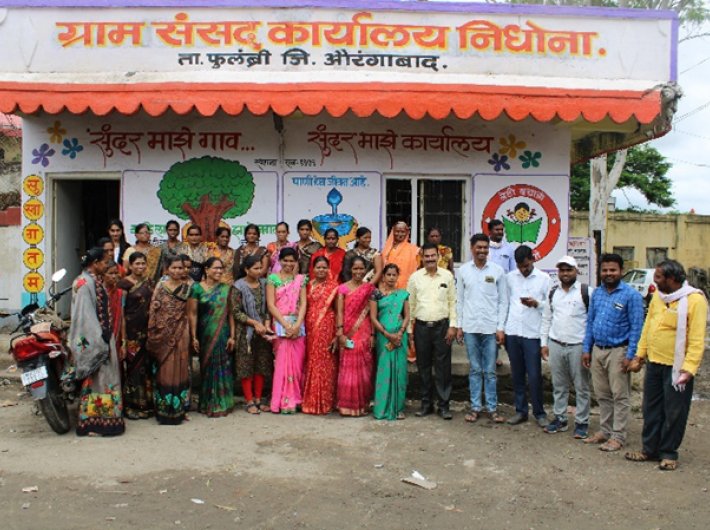Trained to organise and plan, they have started raising their voices – and getting things done too
Ela R. Bhatt, the founder of SEWA, once said, “There is ample proof to demonstrate that women can and do build strong and vital organizations around issues that relate to them, and find viable solutions out of their own experiences.”
Women Leadership Schools (WLSs) promoted by Sehgal Foundation in the villages of India enable women to organize at the village level, so that they can discuss, raise, and plan collective action on the issues that affect their lives. About twenty-five women leaders gather every month to be trained on connecting with each other, on confidence building, about ward sabha and gram sabha and gram panchayat, and ways to include their concerns and priorities in village development. The WLS platform provides an empowering process for women to discuss, reflect, and plan collective action.
Women leaders of WLS in Wawna, Nidona, DongargaonKawad villages (Auranagabad, Maharashtra) and Prasad village (Muzaffarpur, Bihar) have been able to raise their development concerns at the institutional level in the villages. These leaders realized that representing their demands to the gram panchayat individually does not always yield results, while collective voices garner the support of fellow villagers and prompt faster action by the gram panchayat.
Women leaders pointed out that they never get an opportunity to speak in gram sabha of their panchayat, and they are never comfortable to speak in front of so many men. Their voice gets drowned in the din. Hence they decided to use the institution of the mahila gram sabha, wherein a meeting exclusively of women is convened just before the gram sabha. But organizing a mahila gram sabha is itself a challenge as the sarpanch in the gram panchayat is not keen on organizing it; he fears that some difficult questions will be posed to him, and it will be recorded in the gram sabha register. The women leaders of Muzaffarpur similarly wanted to organize a ward sabha (a level below gram sabha) as a provision of a mahila gram sabha is not there in the Bihar Panchayati Raj Act. Overall, the effort of women leaders was to organize a meeting at the institutional level, get the opportunity to speak and be heard, and have their concerns recorded in the official register.
After a lot of persistence, they were able to organize a mahila gram sabha and a ward sabha in their villages. About fifty to sixty women leaders participated in mahila gram sabhas organized in the three villages of Maharashtra, and they raised the issue of poor sanitation, cleaning of drains, control of mosquitoes, access to clean and safe drinking water, and repair of aaganwadi centres. All the meetings were attended by the sarpanch, the gram panchayat secretary and the office-bearers of the gram panchayat.
In Nidona village, the response of the gram panchayat was fast; the road was repaired in fifteen days, and spraying was done to control the mosquitos. The secretary also requested the women to apply for government welfare schemes at the e-office of the gram panchayat.
In Wawna village, the gram panchayat deployed workers to clean the drains and completed the spray for mosquitos control in a week. In Dongargaonkawad, the gram panchayat quickly swung into action and got the roads repaired in front of the school and got the drained cleaned. They also assured they would pursue the government department to get the Aaganwadi centre repaired.
In Prasad village of Muzaffarpur, women leaders raised a demand for piped water supply to their households. They wanted to know the reasons for the delay when pipes, water tanks and other logistics for piped water supply under the government schemes had been supplied long before. The ward member (the elected panchayat representative for the ward) was present in the meeting, and he assured the group a resolution at the earliest. The very next day, all the people from the ward started getting water in their taps two times a day. The women leaders of these four villages are planning to organize exposure visits for women leaders of nearby villages, so that gram sabha/wardsabha can be organized in their villages.
Despite several good results of collection, articulation of voice, and action in India, why can this not happen in every village of India? What stops women leaders in the villages? The challenges are patriarchy in rural India, lack of support from local institutions for women’s participation, and the absence of catalyzing agencies and individuals in the villages.
Ela Bhatt had decoded women empowerment into simple processes. She said that women need to come together for themselves, not against anyone. She added that coming together will give them a voice, and voices do shake the balance and change things in their favour. Women empower themselves by coming together. The catalysing agencies bring technical knowhow, linkage with expertise from different parts of India and marketing ideas accelerate the pace of women empowerment.
Jha is Principal Lead, Local Participation and Development, S M Sehgal Foundation.
